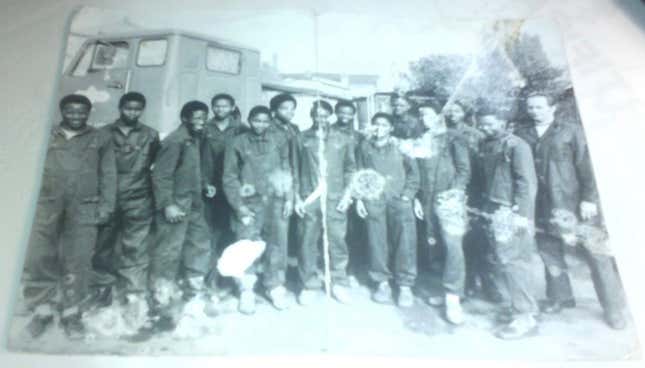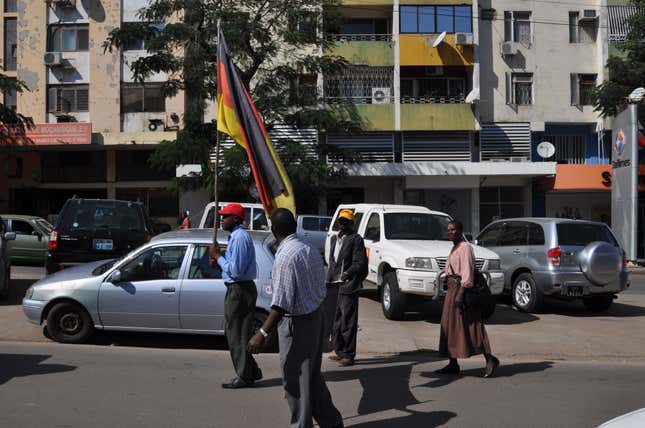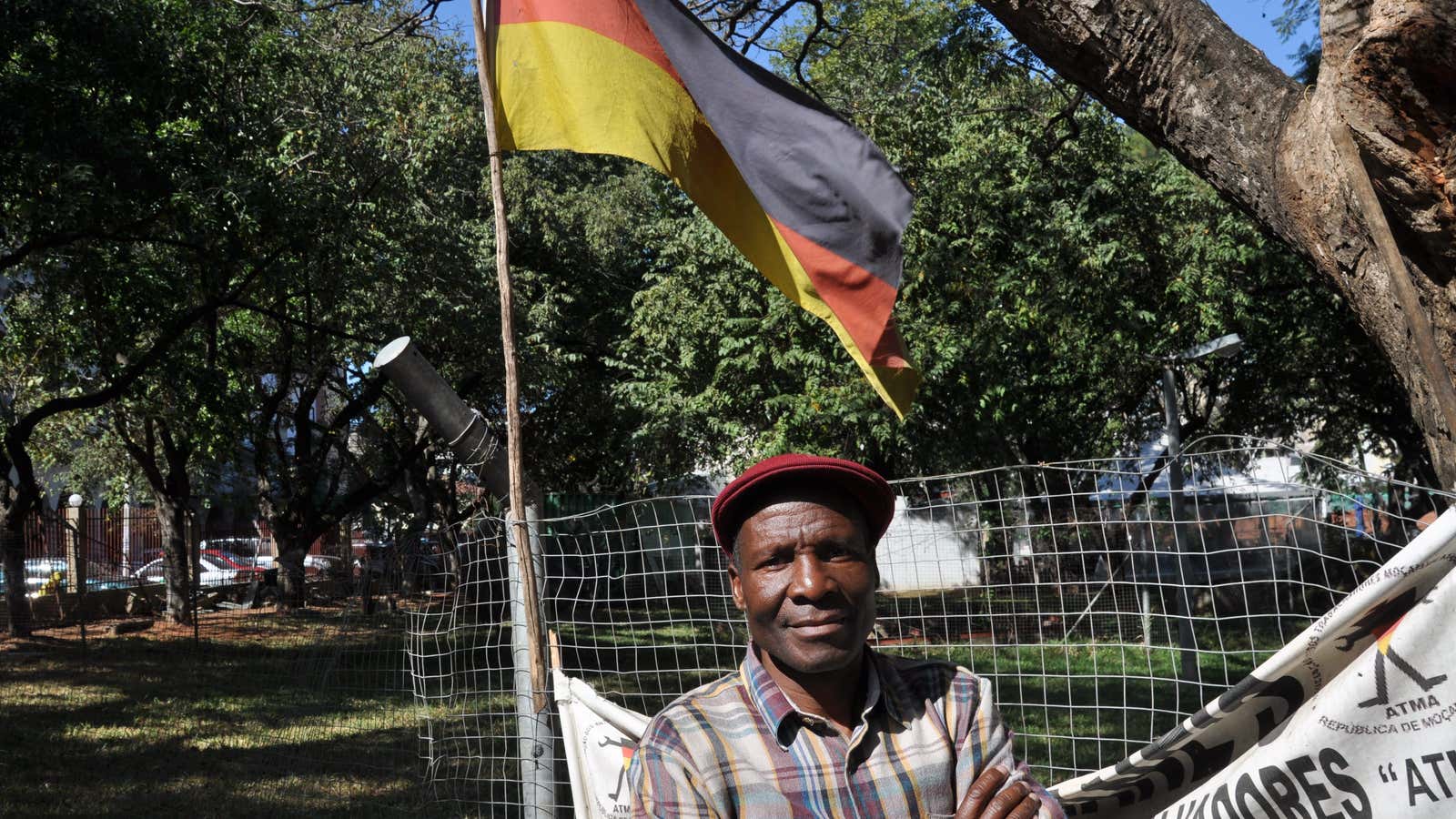Maputo, Mozambique
It’s a Wednesday morning in a leafy square in Maputo, and forty middle-aged men are gathering with their drums, whistles, and German flags. Most hold them aloft, though one has the black, red, and gold wrapped around his head to shelter from the sun. The magermans are preparing for their weekly protest.
“We are the disgrace of scientific socialism!” Jose Candido announces, by way of introduction. Square-jawed and articulate, he is one of the group’s principal organizers, and shares a trait that is always striking in Mozambique: how easily such grand terms are slipped into conversation, and how heavily history seems to lean on people’s lives.
It’s a history that reaches back to 1975, the early days of independence, and the flight of 90% of the territory’s European population that accompanied it. “They abandoned the country,” remembers Jose, as Mozambique lost its doctors, civil servants and engineers in the transition from Portuguese colony to revolutionary sovereign state. “They didn’t agree with the regime that was coming in.”
It left Frelimo, the Marxist movement newly in power, facing severe skill shortages across the country, for Portuguese rule had excluded all but a handful of the local black population from the modern economy, both public and private. Cold War solidarities offered a temporary solution, with cooperantes from across the Eastern bloc soon arriving to staff Mozambique’s schools and hospitals, but Frelimo also held a long-term, more ideologically laden vision.
“We were going to create a society outside capitalism”, Jose, 15 at independence in 1975, recalls Frelimo’s aim to create a non-tribal, non-racial, non-capitalist Mozambique. And to achieve this, the party sought not only to recreate the country but its citizens too, to fashion the homen novo: a new man, modern, skilled, secular and socialist; free from African backwardness, traditions and superstitions.
And so it was that Frelimo sent students, soldiers, journalists, and factory workers to Cuba, East Germany, and the Soviet Union—and how in March 1980, Jose found himself in Berlin sheltering from the first snow he had ever seen in his life.
As Jose remembers it, the government started sending teams into schools and barrios, looking for men and women who had completed their secondary education, encouraging them to sign up. “There was a need to make men…we felt it was a good cause”, he explains, always quick to the politics, before admitting to something a little earthier too. Jose had come from a family of farmers in Inhambane Province—“a difficult life”—before his father decided to move to the capital in search of something better.
The opportunity for Jose to train abroad seemed too good to pass up, particularly as Mozambique itself was increasingly insecure, unsettled by a series of raids further north by the political insurgent group Renamo. “My parents, they saw a brilliant future for their son.”

Volunteers were given no choice over where they were sent, but Jose was pleased when he found it was to be East Germany or Alemanha Democratica, as he still calls it. He had read in magazines that it “was a developed country, that there was no hunger there…that it had no poverty.”
But it was also a country to which Mozambique owed a large debt. And here was a more hard-edged reason for Frelimo sending Jose, and 20,000 others, to its communist ally over the 1980s: to help pay off the 200 million marks (approximately US $110 million) owed to an East Germany itself short of labor. And here too the terms of their migration were set: workers would receive 40% of their salary in Germany; the rest would automatically be transferred back to the government in Maputo, to be paid out in Mozambican meticais on their return.
Regardless, it was a life-changing prospect for the Mozambicans flown to Berlin; some could barely sleep the night before, tense and excited ahead of their first ever plane ride. Jose, after the shock of the Berlin cold on his first day—“era serio!”—was sent to Dresden, where he would spend six months at a polytechnic with Namibians, Polish, Algerians, and others learning German, living in dorm rooms, obeying a 9 o’clock curfew. He remembers his dazed first few days there, guided round by a minder who spoke no Portuguese, explaining with his hands how to take the metro, and introducing him to the local food, “every plate involved a potato.”

Dresden and Germany grew on Jose, before he moved to start his work in Rostock near the Baltic coast, first on a car assembly line, and then cutting metal, where he came across the demands placed on the worker in the supply-led East German economy. “Everyone had to meet their targets in meters, based on what was set by the firm. Your pay was dependent on it.” And though some who went to Germany emphasize the harsh labour conditions, the cramped flats, the racism that, as Jose says, officially could not exist in a socialist state, Jose is smilingly nostalgic as he recounts his nine years there. He recalls friendships with Clauses and Pauls, while in Mozambique white men could only ever be distant ‘patraos.’ He shows a photo of Birgit on his phone, his German girlfriend with whom he still speaks every day. And he remembers Saturday nights at the Dresden disco, dressed up and dancing to Michael Jackson, Bobby Brown and BB King.
What’s more, he felt part of something grander, learning skills to help Mozambique “catch up.” During a holiday in 1986, he returned home to a nation now in a full and brutal civil war. And while shocked to see what it had done to Maputo—“everyone surviving on cabbage”—it left him more determined than ever to carry on his work in East Germany, to “concentrate on our training and our production.”
It wasn’t, of course, to last. For amidst all the euphoria around the fall of the Berlin Wall in 1989, there were thousands of Mozambicans in Rostock, Leipzig, Dresden, and Berlin itself both fearful for their immediate safety—some remember roving gangs shouting ‘foreigners go home”—and worried over their long-term future. In the end, at their places of work, they were offered a choice. “Each one of us had to decide in that moment”, Jose remembers: they could stay, but would have to leave their jobs and support themselves; or they could return to Mozambique and pick up the 60% of their wages that had always been sent to their government. “We were tied”, he says, ruefully, as the vast majority opted to go home to claim what they were owed.
They never were to receive it. And while in the confusion between one country that was ceasing to exist and another nearing the end of a fifteen-year civil war, it can be difficult to trace exactly what happened—perhaps the remittances were used to service debts, perhaps they were pocketed by party officials—it is clear is that the money earned by the migrants had been sent to Mozambique but never paid out thereafter. For Jose, “it was a Machiavellian theft,” who having worked in East Germany for nearly a decade, claims he was due a sum worth around $5,000—a transformative amount in a Mozambique no richer than when he had left it. They have been protesting ever since.
A 25-year demonstration
The demonstration is getting under way now. At their middle-aged pace, the men take the route through central Maputo they have walked every Wednesday for the last twenty-five years, from their base, Jardim 28 de Maio, down the city’s main thoroughfare to the Ministry of Labour less than a kilometer away. There they blow their whistles, bang their drums, cause a minor traffic jam, and chant, demanding “the right to live like men.”
But if overt demonstrations are fairly rare in Mozambique, there is no real sense that anyone in power finds this one threatening. Leading the march is a mandatory police convoy, but the armed officer sitting in its trunk, laughing in conversation on his mobile phone, is utterly distracted. For though at one point the returnees seemed to carry some political force—a clash with the police left one dead in the early 2000s, and periodically the government gave out some small but symbolic amounts to them—the years that have passed have seen it ebb away.
And perhaps most harmful to their success has been the feeling from within Mozambique that they are, in a way, somehow slightly alien, reflected most obviously in the name they have come to adopt, the magermans—the ‘made in Germany’s’. “The regime didn’t integrate us back,” reflects Jose. The distance is, partly, a question of jobs and expectations. Frelimo had sent its citizens abroad—creating new engineers, teachers and factory workers—to people its own communist industrial revolution when they came back.

But effecting such a radical change—from exporter of raw materials to producer of industrial goods – has proved beyond most of post-colonial Africa, let alone war-torn Mozambique. The skills Jose and others had learnt in the factories of the Eastern bloc were mostly useless on their return. Then, as now, what Mozambique sold to the world were its primary commodities: tobacco, cotton, sugar, cashew nuts and coal. In Marxist terms, the magermans had moved from one phase of history to another.
It meant less abstractly that Jose feeds the family he has made in the last twenty years not by cutting metal but by selling second-hand clothes on the side of the road. “Socialists are bad, they’re stupid—write down what I’m saying!” he says, full of energy. “They had good intentions, saying ‘you go be a mechanic, that will be your destiny,’ but afterwards they say, ‘we don’t need that’. They used us to produce money to pay off debts…It was the modern exploitation of men against men.”
But there is also something more profound going on, a sense that over time the magermans have grown out of step with the rest of Mozambican history. It’s not just that they were safely in East Germany when Mozambique itself was ripped apart—a civil war that left one million dead and five million more displaced—but what has happened in the peaceful years since. For two thirds of the Mozambicans alive today were born after both the war and the fall of the Berlin Wall, the latter famously leading the academic Francis Fukuyama to declare “the end of history,” the point at which liberal capitalism became the only game in town. And so it has proved in Mozambique, where from the 1990s onwards a generation of citizens have grown up with the formerly Marxist Frelimo, under the watchful eyes of the IMF, speaking the language not of state-supported industrialization but small government, private enterprise and fostering competitive markets.
“Those who were socialist are now the most savage capitalists,” says Jose. It’s a change reflected in the very square the magermans have made their open-air office, the spot where they start their weekly protests. Renovated under a public-private initiative in 2014, it boasts an ice-cream parlour, a KFC on the corner, and, nearby, a ten-story billboard of a bikini-clad model enjoying her Coca-Cola. Maputo, and Mozambique, has moved on, echoed in a common heckle towards their marches from younger Mozambicans: “just get a job!”
Yet for the magermans, history did not end, moving frictionlessly from a failed socialist past to a prosperous capitalist present. Rather, they are stuck in it. Jose is visited every year by Birgit, his enamorada from Dresden; others have half-Mozambican sons and daughters they cannot see for the lack of a visa; and they are all united by the dwindling hope that, one day, they will receive the life-changing amount they are rightfully owed. For now, admirably and without expectation, Jose and the rest will carry on their protest to a government and country that no longer seem to care: “We have nothing else. They take away your rights. You have no job. It’s the only thing you can do.”
